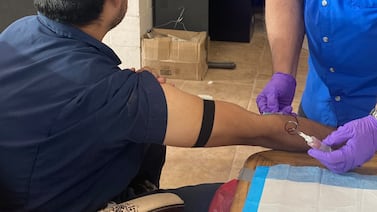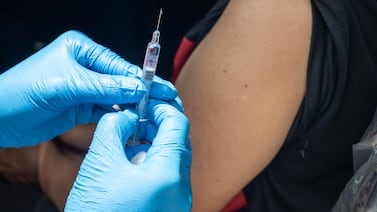Public health, explained: Sign up to receive Healthbeat’s free Atlanta newsletter here.
Community groups from Rockdale County, Georgia, are joining forces with those from East Palestine, Ohio, to push for federal action to prevent serious industrial accidents and punish those responsible when they do occur.
In late September, about 17,000 Rockdale County residents were urged to evacuate their homes after the BioLab chemical plant caught fire, sending plumes of multi-colored gas into the air, causing coughs, and skin, throat and eye irritation for some.
Rockdale County organizers see similarities between the fire and a February 2023 train derailment in East Palestine that contaminated the air, soil and water with hazardous chemicals. That train belonged to Atlanta-headquartered Norfolk Southern.
Now representatives of groups from East Palestine, Rockdale County and other communities affected by chemical spills have created a new organization called the Chemically Impacted Communities Coalition.
“This is a shout from the rooftops,” Stand Against BioLab in Rockdale County founder Madelyne Reece told Healthbeat. There are tremendous similarities between the chemical spills in Rockdale County and East Palestine and other industrial accidents, Reece said.
The coalition includes representatives from about 35 communities, Jami Wallace said during a Tuesday press conference at the Georgia Capitol. Wallace lives in East Palestine and is the president of the Unity Council for the East Palestine Train Derailment. She founded the new coalition.
The group wants to prevent future chemical accidents and to serve as a resource for communities when accidents happen, Wallace said.
Tuesday was chosen for the press conference because it is the 40th anniversary of a major gas leak at a Union Carbide pesticide plant in Bhopal, India. That accident killed thousands of people (3,800 in the immediate aftermath) and injured hundreds of thousands more.
Wallace said the coalition is not partisan, but is focused on “human health” because chemical accidents can affect all Americans. She called for more money for research about the health impacts of chemical exposures, especially exposure to multiple chemicals at once.
Organizers learn from Love Canal, Times Beach disasters
Reece said she never expected to become a community organizer but was “thrust” into the role when she created a Facebook group to help Rockdale residents affected by the BioLab fire to organize. It has grown to about 1,600 members.
Reece said she has learned from the experiences of organizers who responded to the Love Canal disaster, where families and school children were exposed to carcinogenic chemicals that leached into soil and groundwater over years. The effects were first discovered in the late 1970s. And she’s learned from Times Beach, Missouri, where the hazardous chemical dioxin contaminated an entire town, forcing the evacuation and shuttering of the town in the 1980s.
“We want firmer protocols set around these types of facilities that manufacture these types of chemicals, and we want further repercussions,” Reece said. “It’s a slap on the wrist every time and they’re right back at it.”
Residents point to BioLab’s record of multiple chemical fires at its Rockdale County plant and a similar facility in Louisiana as evidence of its negligence.
“This incident and the substantial potential risk that it posed to the surrounding community was completely unacceptable,” Steve Owens, chairperson of the U.S. Chemical Safety and Hazard Investigation Board, said in a statement accompanying an investigation update released Nov. 22.
The report said the Environmental Protection Agency found elevated chlorine and hydrogen chloride levels in the air from Sept. 30 to Oct. 2 after the Sept. 29 fire. The Chemical Safety Board will issue a longer report, though that could take several years.
Leaders of the groups involved in the new coalition aim to learn from each other about the health impacts of chemical accidents and what steps they can take to push for systemic change.
The companies and government officials involved in responding to such incidents are working from “what looks like a playbook,” Reece said. There’s not enough long-term testing after the incidents, she and others said, and officials try to say as little as possible until the public loses interest.
County urged to revoke BioLab’s business license
Residents of Rockdale County and East Palestine are demanding ongoing health monitoring, compensation, and punishment for the companies responsible for the accidents.
Iffat Walker, founder of Rockdale County nonprofit Community Action Now, called on county commissioners to revoke BioLab’s business license.
Attorneys for Rockdale County filed a lawsuit against BioLab and its parent company Kik International in late October in U.S. District Court for the Northern District of Georgia. The lawsuit seeks punitive and compensatory damages for the fire, as well as an injunction requiring BioLab to close its Conyers plant.
BioLab says it will reimburse residents for expenses, including lost business profits, with adequate documentation. It has established a community assistance center and a phone hotline to help residents file claims.
BioLab spokesperson Emma Cloyd said Tuesday the company is cooperating with the Chemical Safety Board investigation and remains “committed to making things right for impacted area residents and business owners.” She also said the Conyers plant has not resumed manufacturing operations.
Norfolk Southern earlier this year reached a $310 million settlement with the U.S. Department of Justice and the EPA. Some of that money will be used to fund ongoing physical and mental health monitoring, environmental clean-up, and improvements to rail safety. The company also agreed to an about $600 million settlement in a class-action lawsuit brought by residents affected by the disaster.
Reece said she would like to see U.S. Rep. Hank Johnson, a Democrat who represents Rockdale County, and Georgia’s U.S. Sens. Raphael Warnock and Jon Ossoff, who are Democrats, sponsor legislation to help prevent such accidents and enforce stiffer penalties when they occur.
Johnson and Warnock were invited to attend Tuesday’s press conference, Reece said, but they did not. The two lawmakers had set a Nov. 13 deadline for BioLab to answer a series of questions about the plant’s safety.
Johnson “will continue to pursue accountability on the federal level for his constituents affected by the BioLab fire, whether that means calling for stricter and stronger regulations for these kinds of facilities handling these kinds of toxic chemicals to calling for permanent closure of BioLab,” spokesperson Andy Phelan told Healthbeat.
Warnock and other Georgia congressional officials have called on the EPA to add the chemical TCCA, which caught fire at BioLab, to a list of chemicals that require detailed risk management plans.
“The senator has remained in touch with local leaders and residents and will do all he can at the federal level to protect the health and well-being of Georgia’s families," according to a statement from Warnock’s office.
Reece is also frustrated with the lack of attention from state officials. Gov. Brian Kemp has not visited the site, although he made a brief statement about the fire during a press conference in October.
“We’d really like to see anything at all from Kemp,” Reece said.
Rebecca Grapevine is a reporter covering public health in Atlanta for Healthbeat. Contact Rebecca at rgrapevine@healthbeat.org.






